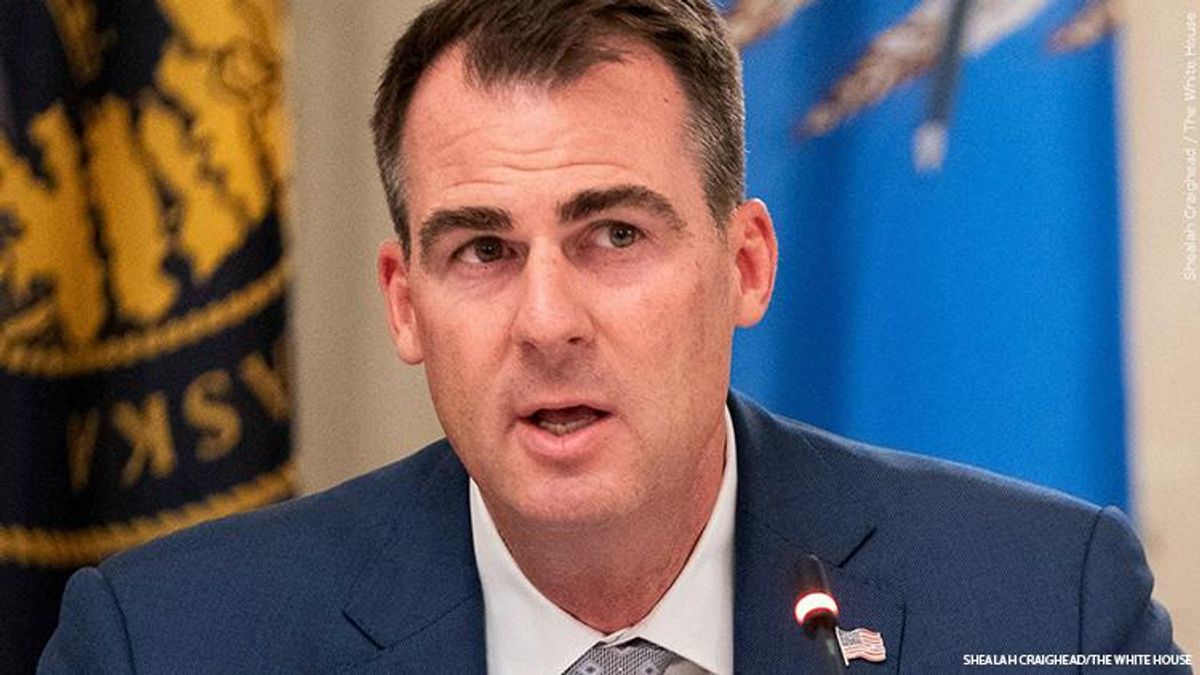Oklahoma Gov. Kevin Stitt Wednesday signed an anti-transgender "bathroom bill" into law.
The measure, Senate Bill 615, requires students in public schools and public charter schools to use the restrooms and changing rooms designated for the gender on their original birth certificate. It applies to students from pre-kindergarten through 12th grade. Anyone who does not wish to comply would have to use a single-occupancy restroom or changing room.
The penalty for schools and districts that violate the law would be a 5 percent reduction in state funding. 'That could subtract thousands to millions of dollars, depending on the school system," The Oklahoman reports. Parents could also sue over violations. The legislation contains an emergency provision that makes it take effect immediately.
"Governor Stitt believes girls should use girl restrooms and boys should use boy restrooms," Carly Atchison, a spokesperson for Stitt, said in a statement.
The bill was proposed partly in reaction to a policy adopted six years ago by the school system in Stillwater, Okla. The district has allowed students to use the restrooms that comport with their gender identity, and "no incidents of misbehavior were reported as a result of the policy," The Oklahoman reports.
But Oklahoma Secretary of Education Ryan Walters has strongly criticized the policy, calling it part of a "woke agenda." He wrote a letter to Stillwater school officials saying that it would make "our young girls uncomfortable and afraid" to use school restrooms. Walters, a Republican, is running for state superintendent of schools.
Civil rights groups are considering legal action against the bathroom law, the Associated Press reports. "This law is unconstitutional, a violation of Title IX of the Civil Rights Act, and more than anything it is unnecessarily cruel for the sake of cruelty," said a statement from Nicole McAfee, executive director of Freedom Oklahoma. "Over the last day we've heard people talk about school safety over and over again. But with a flick of his pen, Governor Stitt said that safety doesn't extend to already vulnerable transgender and Two Spirit young people."
The American Civil Liberties Union's Oklahoma affiliate also denounced the measure. "By singling out transgender students for discrimination and excluding them from restrooms that match their gender identity, SB 615 discriminates based on transgender status and sex in violation of the United States Constitution and Title IX of the Civil Rights Act," ACLU of Oklahoma Executive Director Tamya Cox-Toure said in a statement. "These violations put Oklahoma at risk of losing hundreds of millions of dollars in federal funding, and harms transgender youth, all to solve a problem that plainly does not exist."
The Human Rights Campaign likewise condemned Oklahoma's action. "What states like Oklahoma, Alabama, Tennessee, and North Carolina have done time after time is find new ways to attack these kids for their political gains among radical voters," Cathryn Oakley, state legislative director and senior counsel, said in a press release. "Governor Stitt has repeatedly disregarded the real harms these bills will impose on Oklahoma's youth."
The bathroom measure is one of several anti-trans and other far-right bills the Oklahoma legislature has passed and Stitt, a Republican seeking reelection, has signed into law during this session. One bars trans girls and women from competing on female sports teams in both public schools and private schools that compete against them, and it extends to state colleges and universities. Another prohibits nonbinary gender markers on birth certificates.
And also Wednesday, Stitt signed one of the nation's most restrictive abortion bills into law. It bans abortions from the moment of fertilization, with exceptions only in "medical emergencies or if the pregnancy was a result of rape, sexual assault or incest and reported to law enforcement," CNN notes.
It clearly violates Roe v. Wade, the 1973 Supreme Court decision that legalized abortion nationwide, but the high court is on track to overturn Roe,an action that would allow states to restrict or ban the procedure. But even though Roe is still standing until the court issues a final opinion, the Oklahoma law takes effect immediately. Civil rights groups are considering lawsuits.


















































































Fans thirsting over Chris Colfer's sexy new muscles for Coachella